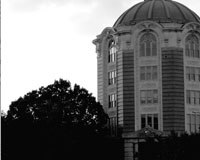
Nazilli, Ürgüp
1
On the day capitalism triumphs
as its enthusiasts imagine
and all places are rich
and, as Rilke said, “friendly,”
or the day it’s destroyed
by a worldwide uprising
of ghosts,
and everyone is equally good
or equally evil
and therefore, in either case
(as the rabbis hinted),
the Messiah comes –
on that day there will be
no more poems on the subject
of tourism.
What shall I write then?
What theme may I see
descending the scrubby hills
accompanying the highway,
where dying villages are,
unexcavated ruins,
and no roads?
What would make me sit up
from the lethargy of travel
and scrape my face with a Moist Towelette?
This town is poorer, which also means
less opaque. The mosque
follows the absolute template
for mosques, but its one minaret
is stunted, the plaster
painted to look like stones
up to the loudspeaker;
no pretense that anyone ever climbed it.
A body shop looks like a body shop,
the cars like nothing, alleys like alleys
patrolled by those communal dogs
who are neither asleep nor dying.
In a window marked Internet
between two rug-stores, ten-year-olds cluster
around video games;
by now they have conquered many galaxies,
their sisters looking on.
We’re inland: women are tubes
from face to ankle, like colorful, dusty
artillery shells. They’re out,
arm in arm, to shop, and to swing
their infants a moment
in the tiny plastic playgrounds.
While in the cafés, two per block
and likewise low-overhead, men
share tabloids and waterpipes, watch
TVs in corners, argue,
play backgammon. It’s ten AM.
I realized yesterday
that Why? and Are they unemployed?
are flawed – decontextualized – questions.
Fiftyish, styleless, one sits alone,
for the moment at least without
friends, a paper,
a family, expression,
even coffee. It’s unclear whether
he sees the tour bus pause in traffic
or meets my glance or hears in any way
my sudden, telepathized Brother.
2
The hotel – all the caves
on that hillside – was once the mansion
of a Greek merchant who “left long ago.”
Thus the girl from the office,
with the usual shadowless pleasantness,
dimmed by a long day
and the certainty that we were staying.
Left, I thought. He didn’t leave.
He was kicked out.
Him, his family, half the town.
He may have owned a car.
They may have reached the coast,
even Greece, and glimpsed your family,
equally starving, coming the other way.
I didn’t say it, pending further research.
Not my period, or my fight.
And she might well have had no idea
what I meant.
The room was a barrel-vault,
vines and goddesses,
hints of columns dissolving
into vanilla tufa. The cobblestones
beyond our terrace led gradually
to restaurants with other views
of the cone hills, used or empty caves,
a distant, no-doubt sacred peak
and the roofs of the town. At dusk, an air-show –
one held one’s breath – of swallows; the sky
taking on for a moment
the color of the stone; the echoing,
unsynchronized call
to prayer. I could do nothing
with the ten thousand cave-cities
hundreds of miles around and below us.
Where Hurrians, Hittites, Lycians, Lydians,
Greeks, Persians, Romans, Byzantines,
to name a few, had hidden. Was someone
still down there? What were those low dark warrens?
An image of the mind,
necessarily. But, fresh from a shower,
I could make nothing
of the metaphor – scared crowds
among their goats and oil-lamps,
colonizing downwards. Just as
during the day I had felt
only heat and fear of thistles
as we climbed from one cave-chapel
to the next. The guide
was good but, turning his light
on robes and upraised hands, could not tell us
which haters of images, in which century,
had cut out the eyes.
3
I learned English in prison.
The Oxford Turkish-English Dictionary.
Someone had left it in my cell, an earlier guest.
It was damp, but I dried it.
I learned word by word.
I studied grammar later.
There was a military coup.
They wanted to join the global marketplace
and they wanted less – fewer? –
politics, especially left-wing types.
A million people were arrested, two million blacklisted.
You don’t ask about torture and I don’t talk.
I was a teacher, I was trying
to organize teachers here. When they let
me out, they said You won’t go near
a school again.
Which is your airline?
I believe man is good, I believe people want
equality and justice, and will have them eventually.
Frederick Pollack is the author of two book-length narrative poems, The Adventure and Happiness, both published by Story Line Press. Other poems and essays have appeared in Hudson Review, Southern Review, Fulcrum, Salmagundi, Poetry Salzburg Review, Die Gazette (Munich), The Fish Anthology (Ireland), Representations and elsewhere. Pollack is an adjunct professor of creative writing at George Washington University, Washington, DC. Online, he has been recently published in Occupoetry, Century 121, and Kalkion.

